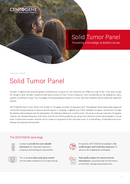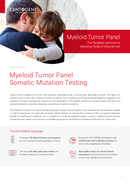Somatic Mutation Testing
Testing for the presence of cancer requires the utmost personal care and consideration. Somatic mutation testing is enormously beneficial for improving the prognosis and the quality of life of cancer-affected patients. Our team of hereditary and somatic cancer experts will support you during every step of the process.
Identifying Somatic Mutations for Tumor Profiling
Every cancer cell can evolve its own pattern of mutated genes.
Each person's cancer, and even parts of a single tumor, can become completely unique. This has implications with respect to diagnosis, prognosis and treatment response. The presence of recurrent somatic mutations allows us to create a detailed molecular fingerprint of the tumor and to identify important tumor subtypes.
How Can Somatic Genetic Testing Help Patient Care?
Somatic mutation analysis is a standard of practice for tumors in order to identify therapeutic sensitizing and resistance mutations. This allows a finer assessment of the diagnosis and prognosis and targeted therapies directed towards the individual patients tumor profile.
What Do We Know About Somatic Mutations?
Cancer is one of the leading causes of morbidity and mortality worldwide. Cancer can be the result of a genetic predisposition that is inherited from family members (germline (hereditary) gene mutation) or it can be the result of the acquired mutations accumulated during a lifetime (somatic (acquired) mutation).
Unlike regular cells, cancer cells do not experience physiological elimination of “programmed cell death” or “apoptosis”; instead they continue to grow and divide. Tumor cells show uncontrolled proliferation if there are mutations in the genes involved in cell division .

Somatic Mutation Testing for Myeloid Tumors
Genetic testing of myeloid tumors can help you make accurate diagnoses, provide prognoses, choose appropriate therapy and counsel patients
Note
Hotspot targeted mutation testing is unavailable in the US for the following mutations: BRAF c.1799T>A p.V600E, EGFR c.2573T>G, p.L858R, KRAS c.35G>A, p.G12D, KRAS c.38G>A, p.G13D, KRAS c.35G>T p.G12V, NRAS c.181C>A p.Q61K, NRAS c.34G>T, p.G12C, NRAS c.35G>A, p.G12D, NRAS c.182A>G, p.Q61R.
Resources
Useful Links
Downloads

Solid Tumor Panel – Product Sheet
Providing knowledge to battle cancer

Myeloid Tumor Panel – Product Sheet
The targeted approach to detecting myeloid malignancies
Scientific Publications
Turning Rare Disease Networks into Knowledge
CENTOGENE’s well-recognized expertise in Gaucher disease (GD) has helped to establish a global network of physicians interested in and aware of this rare metabolic disorder. The fact that CENTOGENE […]
Related Webinars
CentoGenome Webinar - ‘A Look Into the Power of Whole Genome Sequencing’
Throughout the webinar, Prof. Peter Bauer will provide you with an overview of Whole Genome Sequencing (WGS) and share insights from our latest study – unlocking the clinical utility of WGS.
CentoWebinar – 'Um olhar sobre o poder do sequenciamento completo do genoma'
Ao longo do webinar, nosso convidado Dr. Salmo Raskin, fornecerá uma visão geral do sequenciamento completo do genom (WGS) e compartilhará as percepções de nosso estudo mais recente - revelando […]
Genetik & Amyloidose: Polyneuropathie und Kardiomyopathie
Sehen Sie sich jetzt unser Webinar über die angeborene TTR Amyloidose an. Hierbei handelt es sich um eine autosomal-dominante Erbkrankheit, die durch Mutationen im TTR – Gen verursacht und häufig […]
Get in Touch With Our Customer Support
Our consultation service is available in several languages.
+49 (0) 381 80 113 - 416
Mon. – Fri. 7 a.m. – 6:30 p.m. CET
Sat. 8 a.m. – 12 p.m. CET
